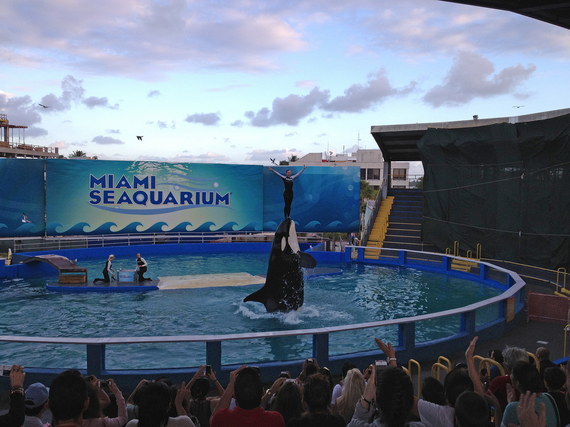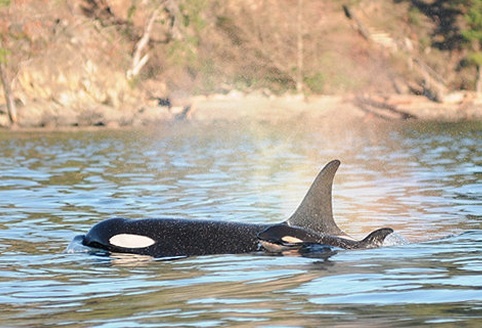As children we once sat transfixed by the Sea World theatrics of a gigantic black and white orca whale leaping out of a tiny tank and with a mighty tail fluke splashing us with water. As adults we now sit in dark theaters watching the disturbing film Blackfish." We witness an orca, Tilikum -- after years of inhumane captivity -- finally stop performing mind-destroying tricks and kill a trainer.
As children we believed the world existed for our entertainment; as adults we understand that we have both power and responsibility for other animals. We can change their worlds and our cruelty.
Lolita swims alone in Miami's Seaquarium. Photo credit: Gigi Glendinning
This Saturday there are worldwide marches for the wild-born Lolita, the orca who has spent 44 years in captivity in a Miami Seaquarium, performing three shows a day for us -- as if we have not grown up. On Facebook and Twitter the word is spreading that it is time finally to set free, rehabilitate, and return to the wild this longest living captive whale. Her pod and the world await her. Lolita's mother and her cousins still swim free in Washington's Puget Sound waters with the J, K, and L pods, of the Southern Resident orca clans. Can you imagine the family reunion when Lolita is returned to them?
Whales belong in the wild. The largest of dolphins, orcas, have lifespans that rival humans. The oldest orca, matriarch Granny of J pod, is 103 years old and continues to lead her J Pod in travels as far as 50 kilometers a day. Orca brains are over four times larger than our brains. Scientists have well documented their complex culture of communication, cooperative hunting, and peaceful, matrilineal societies. Orcas stay with their family pods for life.
As dolphin expert and reformed trainer, Ric O'Barry says, "Orcas are the most social animal on Planet Earth. When they get together they get together -- for life."
In our immaturity and lack of knowledge about orcas, we didn't know that orcas had families or lived to be 100. We nicknamed them "killer whales" because transient orcas prey upon other marine mammals. Our Pacific Northwest orca pods survive only on Chinook salmon, a dwindling food source because of our hydroelectric dams.
The U.S. Navy once used orcas for target practice and still harms and harassas orcas by testing their lethal military sonar, even in a Washington State marine sanctuary. And in 1970, when Lolita was only 4-years-old, her L pod of matriarch, cousins, and calves was brutally rounded up in Penn Cove, Washington in what remains one of the cruelest captures ever recorded.
"It was a terror operation," says Ken Balcomb, of the Center for Whale Research, who has deeply studied these Southern Resident Pods for decades. "The orca hunters threw bombs into the water, herded them with every kind of speedboat and aircraft. They could not escape."
The orca families screamed so loudly their vocalizations could be heard in surrounding neighborhoods. Traumatized orca mothers were violently separated from their calves, including Lolita. Trying to protect the pod, four young orcas charged the nets. They died in their vain attempt at rescue.
One of the orca hunters was so shattered by what he witnessed and took part in, that he began weeping." Afterwards, he decided to take responsibility by testifying before Congress about this capture. This act of accountability led to the Marine Mammal Protection Act of 1972, outlawing any more captures in American waters.
Lolita, the calf who was kidnapped from her family pod still swims alone in Miami, in the smallest tank for any marine mammal. The tank is only 80 ft. by 35 ft., in clear violation of the Animal Welfare Act. This tank is so shallow she can't stand up in its waters. Here in this cement prison for the past 44 years, Lolita is deprived of family, social bonding with her own kind, and any semblance of a normal life.
"You wouldn't treat your own dog this way," says marine mammal biologist, Dr. Ingrid Visser, whose You Tube video shows Lolita's life as it really is. Solitary Confinement. When crowds flock to Miami to see Lolita perform, they are seeing a depressed and grieving whale, explains Dr. Visser. How is that educational? How is witnessing such animal suffering entertainment? The orca in Miami before Lolita was Hugo, who exhibited what scientists call the "depressed whale syndrome" --listless swimming in endless circles, dorsal fin flopped to the side, and ramming his head against the glass tank repeatedly. Hugo died of a brain aneurism from this suicidal head trauma. Another captive whale, Corky, is in San Diego's Sea World; and there are other captive orcas all over the world.
Public opinion is now decidedly turning against orcas and other dolphins in captivity. In 2014, NMFS officially agreed that Lolita should be listed with her native Southern Resident pods as endangered; that ESA listing should become official by Jan. 27th. There is a robust plan to compassionately retire and return Lolita to the wild. Orca network and Center for Whale Research have outlined a step-by-step rehab for her successful rehabilitation.
We are maturing in our relationship with orcas. Here in the Northwest, we now celebrate our J, K, and L pods. Each orca birth is front-page news and met with great ceremony and jubilation. Video of our "New Year's" orca calf, J50, is heartily welcomed as hope for a pod that has dwindled down to 78 residents, after the recent deaths of a pregnant mother and another calf. Schoolchildren compete to name the new female orca and we watch with open-hearts every time the new calf is spotted surfacing, tucked securely between her mother, Slick, and auntie, swimming free.
"It's a Girl!" J50 the new orca calf born to J pod in Pacific Northwest. Photo credit: Center for Whale Research
For these highly intelligent, socially sophisticated, and family-loving orcas, we can do so much better than continuing to enslave and teach our children that these sentient fellow creatures should be captive in cement bathtubs for life.
"We live by stories that we make and tell," says Orca Network's Howard Garnett, who has long led this campaign to free Lolita. He reminds us that orcas have brains like hard drives with a lot of storage and memories. When Lolita returns to her home waters, she will draw upon her big-brain memories of this home and her deep family bonds. "It will all come back to her," he says.
Just as we once stole Lolita away from her pod, we can now finally bring her back home to her family -- and to us.
Join the Miracle March to Free Lolita, including one on Alki Beach, in Seattle.
Watch video of "Freeing a Captive Whale" and "Voice of the Orcas"
Brenda Peterson is a National Geographic author and memoirist whose 18 books offer three decades of writing about whales and dolphins, including a YA series, The Drowning World. Your Life is a Book: How to Craft and Publish Your Memoir is just out and featured on Oprah.com. www.BrendaPetersonBooks.com

